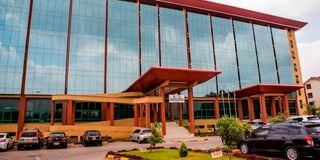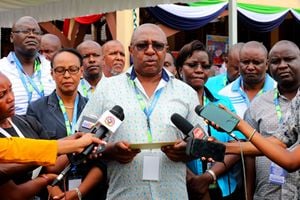
New Mitihani House building pictured on August 31, 2023, in South C, Nairobi.
The Kenya National Examination Council (Knec) paid Sh2.8 million to 203 ghost examiners in the 2022 Kenya Certificate of Secondary Education (KCSE) examinations, an audit has revealed.
According to the audit report, the 203 examiners were not validated in Knec's database, leading to irregular payments of Sh2.8 million.
The payments are part of a scrutiny over financial inconsistencies amounting to Sh4.2 billion in the financial year ending June 30, 2023.
The report by Auditor-General Nancy Gathungu dated April 2024 fingers the council for unauthorised overspending without proper documentation or approval from the cabinet secretary for Education and the National Treasury.
The report also points to discrepancies in Knec's financial records which do not match figures in its accounting system and concerns over personnel expenses, operating income and examination fees.
On payments to the ‘ghost’ examiners, the report reflects examination expenses of Sh8,314,809,520. Included in this amount is KCSE expenditure of Sh5,117,026,710.
However, analysis of payments made to KCSE examiners for the December 2022 examinations revealed that a total of Sh2,864,760 was irregularly paid to 203 examiners who had not been validated in the database of the council as stipulated in Section 3.14 of the KNEC user guide on management of examinations (KCSE) 1st edition, 2017. In the circumstances, the regularity of examination expenses of Sh2,864,760 could not be confirmed.
The auditor-general's report further reveals that Knec's liabilities which stand at Sh4.1 billion are more than double its assets of Sh2 billion, leaving the council with a negative working capital of Sh2 billion, making the examinations body technically insolvent.
According to Ms Gathungu, this raises doubts about Knec's ability to meet its financial obligations. A troubling aspect of the audit is Sh239 million in outstanding prepayments and receivables from exchange transactions, of which Sh103 million is in imprests that have remained uncollected since 2018.
Statutory deductions
Despite this long-standing issue, Knec has failed to provide evidence of any effort to recover these funds casting doubt on the recoverability of the amounts listed in its financial statements.
The report also highlights discrepancies in statutory deductions including pension and NSSF contributions. The financial statement shows Sh111.3 million but the system data lists Sh111.2 million, creating a Sh1.1 million discrepancy. Inaccuracies such as this point to weak financial controls within the council, the report states.
Further concerns are raised over Sh12 million paid in rent for office space Knec no longer occupies. The council vacated three floors at the National Housing Corporation (NHC) building in the CBD but continued paying rent for the unused space, together with parking and service charge because it had not found a replacement tenant.
“The statement of finance performance reflects housing of staff office accommodation expenditure of Sh95, 224, 575. The amount includes rent paid to the National Housing Corporation amounting to Sh12,193,555 for three quarters of the financial year under review.
New Mitihani House
“It was observed that only the 4th floor was still occupied by council staff as all other personnel had relocated to the New Mitihani House in South ‘C’. Management explained that the council continued to pay rent for the unoccupied floors because they were yet to be occupied by another tenant. However, the lease agreement did not have such a provision and it is not clear why the council had not reached an agreement with the landlord for early termination of the lease for the unoccupied floors. In the circumstances, the regularity of rent expenditure of Sh12,193,555 could not be confirmed,” reads part of the report.
The auditor-general criticised Knec for failing to renegotiate the lease and terminate payments for unoccupied offices.
The audit also sheds light on donor project funds totaling Sh164 million that have remained dormant in Knec's accounts for 17 years. The funds, which were meant for educational development projects such as an essay competition sponsored by the Aga Khan Development Network and Rockefeller Foundation, were never remitted to the Consolidated Fund as required by Public Finance Management regulations.
Examination fees, totaling Sh3 billion, are another area where Knec's financial controls were found wanting. The council has been generating duplicate invoices, with 112 institutions receiving multiple invoices for the same payment. The system also fails to synchronize invoices with bank collections, forcing Knec to manually reconcile payments.
Knec’s assets valued at Sh1.1 billion by June 2023, are at risk due to the council's failure to maintain a proper record raising questions about the safeguarding of public assets under the council's management.
Moreover, the report notes that several issues raised in previous audits, including a lack of effective internal controls, risk management, and governance, remain unresolved. These findings have been repeatedly flagged, yet as of June 30, 2023, no significant corrective action had been taken by Knec.










